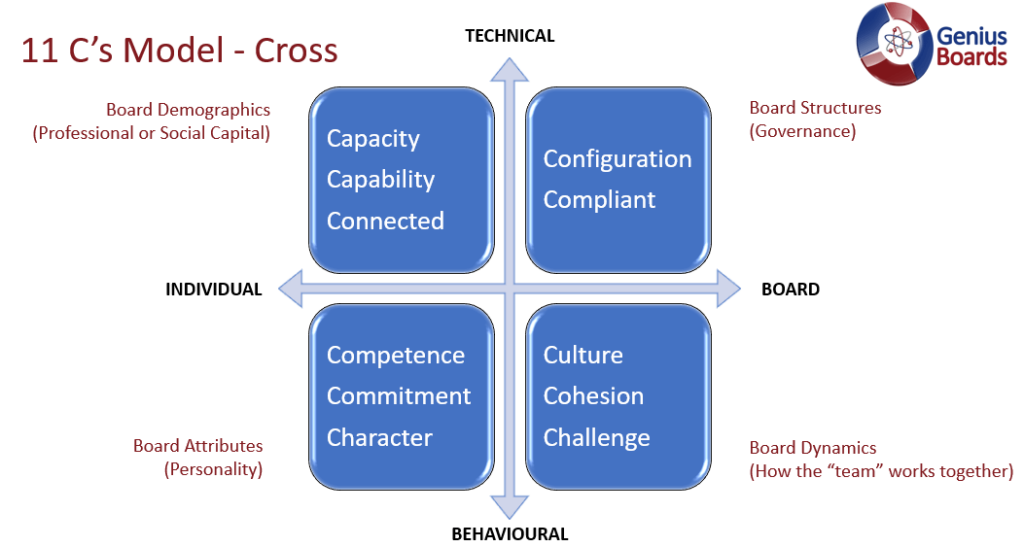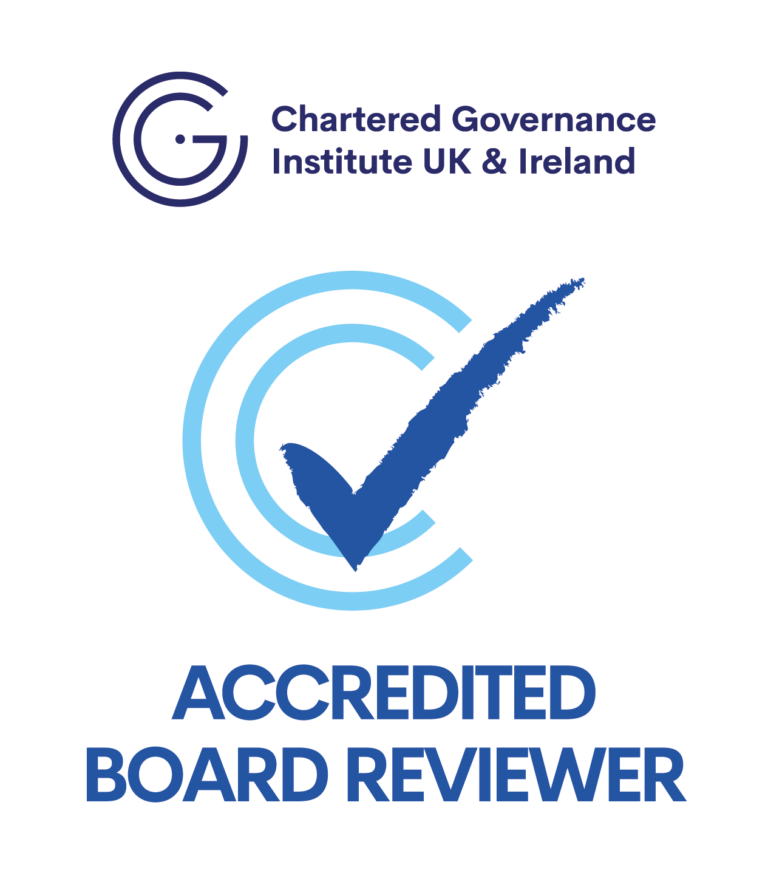Article Two of a total of seven Attributes Articles
In our previous weeks’ article series, Genius addressed “Board Structure” and “Board Demographics” and their influences on Board effectiveness.
This mini-series, Genius is addressing the three “Board Attributes” topics of Competence, Commitment, and Character.
To keep reading easy, Competence has been split into three Articles – Within the Role, Leadership and Engagement (this article), 21st Century & Governance Competence.

Board Attributes addresses, within the physical people appointed to the Board, their collective personalities, and how these factors impact on Board effectiveness.
Competence
Competence addresses how the Director delivers on their responsibilities. Competence encompasses a wide range of personality influenced factors that we shall review.
2. Leadership & Engagement Competencies
a. EQ
“EQ” is Emotional Quotient” more helpfully described as “Social Quotient”.
When talking about EQ, we are referring to the ability to “communicate”. To listen, to observe, to read body language, to be mindful of yourself and others, to recognise your impact upon others, to be balanced, rational, to be able to debate, to change one’s mind …. it is not about being “emotional” in the more commonly understood use of the word.
In a later article we shall delve into the pillars of emotional intelligence and the ability to recognise and manage emotions within oneself and others.
Daniel Goleman, a leading psychologist in this field states that great and effective leaders have high emotional intelligence
We all have IQ and EQ in different quantities, IQ we are born with, EQ some have a greater affinity for, but it can be learned. Being self- aware and being empathetic allows a leader to deal with difficult situations, whilst retaining the respect of others.
There is a dark side to EQ, where empathy is used by narcissists for “evil” outcomes.
The Company Secretary often has high EQ, either learned in the role, or a predisposition towards it. Another role that often shows good EQ skills is that of Senior Independent Director (SID). This is immensely helpful on a Board where the Chairman has lower EQ skills.
The higher the EQ skill of a Chairman, the better chaired the Board will be, being a key component therefore of Board effectiveness.
b. Style
For the Chairman, there are many styles of leadership that can be brought to bear as the leader of the Board.
A difficult, but comfortable one for example would be laissez-faire; this does tend to leave the Directors or CEO moving the agenda on. The style brought by a Chairman who used to be a CEO in the industry can be overpowering for a CEO to manage as the Chairman typically starts to “tell” the CEO what to do.
Strategic leadership is without question the best for a Board, staying out of the executive function, having clarity of strategic vision to support executive strategic stretch, and keeping the focus on the future and the goals.
Style is also considered within all the other Director roles. If a Director is autocratic in nature, they will find it difficult to debate with colleagues, whereas a Director that has broad knowledge and ability to apply their mind to all topics will bring a soundness to conversations.
A style of never speaking or never stopping speaking are equally two ends of a continuum that do not deliver effective conversations and need strong chairing to get the one to speak up and the other to get their point across succinctly, whilst leaving space and time for others to contribute.
It is helpful for a Chairman to identify the styles of Directors so that the chairing creates the best outcome.
An analogy I like to consider is that of an orchestra conductor who does not have a musical instrument, but their competency can pull together a disparate number of people and instruments and create a symphony.
c. Personality
There are the individual personalities and there is the collective personality.
A change in one Director will have an impact on the group personality, but a change in the Chairman will have a transformational effect on the group personality. The personality, the ethics, the moral compass of the Chairman will have a direct impact on the “tone from the top” of that Board and how that Board is seen in the eyes of other stakeholders.
An example of this would be, a Board that has changed from a finance-led Chairman to a strategic led Chairman, where the first Chairman had quite a disengaged style and responded when contacted, to the strategic Chairman who had the business front of mind and made proactive contact on strategic points of value.
The above two Chairman would have a quite different relationship with the CEO, using different techniques to get the best-shared leadership relationship working at its best. This relationship of constructive tension is probably the most difficult relationship in the UK governance structure to succeed at and be effective.
A critical foundation to our governance framework of shared accountability.
Having a personality on the Board that is outspoken, gregarious, and up for a laugh compared to a personality that wants to get into the technical detail will need strong chairmanship and leadership to ensure each is able to contribute fully to that Board.
d. Share / Inclusive
At the Board level, one expects that all the Directors have equal knowledge. There is a difference between executive and non-executive in terms of the detail, but not in terms of the strategy and the key business information.
It goes wrong when any Director does not share information that they have in an appropriate way, and open socialising might well not be the way forward.
What is important for a Director to recognise, is if they have information that could have a direct impact on the business, its market, the company’s reputation, a person, its turnover or profitability, as just some examples. It is the duty of the Director under Section 172 to ensure that information is shared appropriately. Usually the first course of action is to engage the Chairman, but if for any reason, this is not feasible, then the SID would be the right person to discuss the issue with first, and then together determine the next steps.
It is difficult if a Chairman becomes aware of certain information that could have an impact on the business, and to try and solve or reduce the impact does not share this appropriately with the other Directors. This typically has a negative or disastrous outcome, far worse than dealing with sharing the information right from the start.
An inclusive style gains supporters, brings other minds and points of view to the discussion, and results in a team taking the decision and the resultant implications. This is usually more considered, less rushed, and responsive rather than reactive.
When all Directors have the same information, the debate will consider all the facets of the issue more effectively, supporting a better outcome and a majority or full support.
e. Engage
All Directors need to be engaged. This is easy for the Executive Directors as they are in the business; their challenge is when to engage as a Director and when to engage as an Executive.
For the non-executive Directors, being engaged in the business is critical. Arriving at a meeting unprepared, not having engaged since the last meetings, and reading the papers on the board portal during the meeting is firstly obvious to others, disrespectful to the team and contrary to their duties as a Director.
Being engaged, means more than being prepared and contributing to the meetings and in Committees; it means thinking about that business all the time, being mindful of what the Director sees in the external market. What would be of value, identifying opportunities, being sensitised to risks, being aware of people’s frame of mind and well-being, and recognising where there might be pressure points for the Board to consider are a few examples of effective engagement.

















